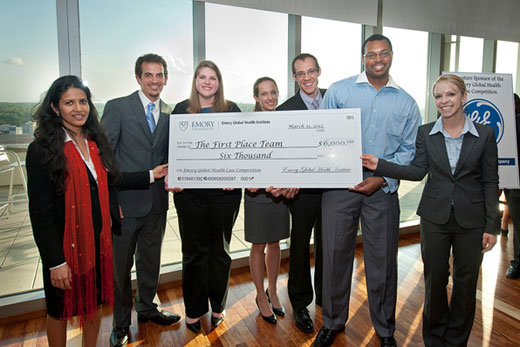Emory University won its version of the Final Four this weekend when it placed first in the Emory Global Health Institute's International Global Health Case Competition, which took place March 30-31 at the Rollins School of Public Health. The winning Emory team competed against multidisciplinary student teams from 22 other universities.
Boston University won second place and the Participants Choice Award, while the University of Southern California and the Instituto Tecnológico Autónomo de México won honorable mention awards. The University of Alabama at Birmingham won the competition's Innovation Award.
"This was my first case competition and I really enjoyed it. I enjoyed the stress of putting together a presentation with new people from different fields, and I enjoyed meeting and networking with new people from different fields and different schools," said Catherine Shih, a member of Boston University's team.
Shih's excitement is indicative of the growing interest in the Emory Global Health Case Competition, which was launched on a shoe-string budget in 2009 as an intramural competition with 48 Emory students participating. The first case competition was hugely popular among Emory students, and it has grown in budget, reputation and number of students participating. This year's internal Emory competition had 72 Emory students participate, and the Institute hosted 134 students during this most recent competition.
This case competition also marked the first time that students from universities outside of the United States participated. In addition to Instituto Tecnológico Autónomo de México, international teams included Canada's McGill University, Colombia's Universidad de los Andes, and the United Kingdom's University of Oxford. Additionally, the University of British Colombia and Israel's Ben-Gurion University competed in a pilot contest via video stream, which took place at the same time as the full case competition. Ben-Gurion University won the video stream competition.
U.S -based guest university teams included: Boston University, Claremont Graduate University, Cornell University, Dartmouth College, Duke University, Northwestern University, Princeton University, Tulane University, University of Alabama at Birmingham, University of California at San Francisco, University of Chicago, University of Miami, University of Pennsylvania, University of Southern California, University of Virginia, Vanderbilt University, Yale University and Yeshiva University.
Human rights and health
The case competition teams were asked to assist Bruce Anderson, the case subject's fictional Sri Lankan country director for CanAID, Canada's Agency for International Development. The case outlined Sri Lanka's long history of social and political unrest and the resulting social and health disparities that exist between the country's majority Sinhalese and minority Tamil populations. In the case, CanAID has received heavy criticism for working with Sri Lanka, which allegedly engages in human rights violations, and is asking Anderson and the competition's 23 multidisciplinary student teams to prioritize programming and justify its continued presence in the war-torn country. Emory's winning team presented a case that focused on improving mental health in underserved areas of Sri Lanka.
The competition's signature sponsor was the General Electric Company. Other sponsors included Danya International, North Highland Worldwide Consulting, The Pendleton Consulting Group, John Snow, Inc., Alston & Bird LLP, the Raymond Mikulich Charitable Foundation, and the Red Brick Brewing Company.
"Being part of Emory's Global Health Case Competition was an incredible experience. The sheer creativity and diversity in the ideas and the solutions that the teams brought forth to the complex case was very inspiring," said Moitreyee Sinha, a technology leader at General Electric who served as a competition judge. "I was very impressed by the quality of the presentations and the depth of knowledge that the students demonstrated on the topic. I also enjoyed the intense debates and discussions with the other judges through the day as we reviewed the solutions from diverse perspectives.
"This is a great forum for bringing together students and global health professionals using a current, real-world health issue, and it was very rewarding to feel the energy, edge and conviction of these young teams."

